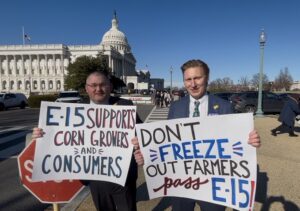 Iowa corn and ethanol producers are sending a message to President Trump as he visits their state today and asking for his help to finally push E15 access through Congress.
Iowa corn and ethanol producers are sending a message to President Trump as he visits their state today and asking for his help to finally push E15 access through Congress.
Iowa Corn and Iowa Renewable Fuels Association (IRFA) published an open letter to President Trump in the Tuesday edition of the Des Moines Register thanking him for his constant support of nationwide, year-round E15 and asking for his continued leadership on this issue as a task force created by Congress considers the future for the renewable fuel.
The letter states: “Congress has appointed a task force, co-chaired by Iowa’s Rep. Randy Feenstra, to consider the critical need for nationwide, year-round E15 with a vote scheduled for the end of February. Without permanent access to this market, the long-term viability of our state’s largest economic driver is at serious risk. Today, we are asking for your help to finally push E15 access through Congress.”
“Removing the outdated regulatory hurdle for E15 is exactly the type of government efficiency you’ve worked for. We urgently seek your ongoing assistance as Congress debates E15 over the next month. Permanent nationwide access to E15 is a common-sense, no-cost solution to strengthen American energy dominance and provide a vital lifeline to Iowa’s growers. We look forward to your continued leadership on this issue and remain ready to work alongside you to move this critical policy across the finish line. Now is the time.”
President Trump is expected to make remarks at the Horizon Events Center in Clive, Iowa focused on energy and the economy. Some sources say he may also hold a meeting with ag producers while in the state.












